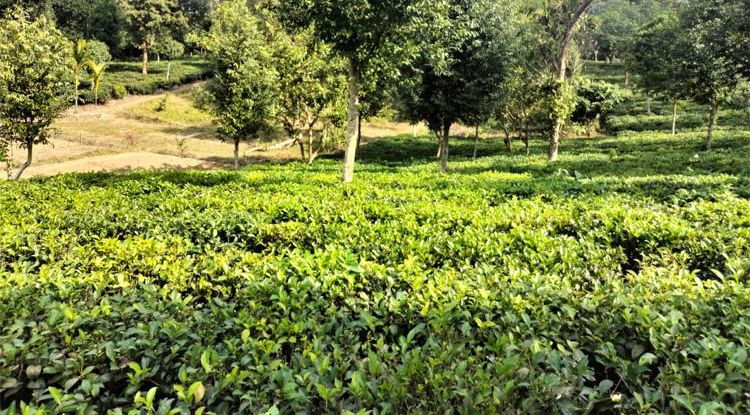সিলেট ৪ঠা এপ্রিল, ২০২৫ খ্রিস্টাব্দ | ২১শে চৈত্র, ১৪৩১ বঙ্গাব্দ
প্রকাশিত: ২:২৩ অপরাহ্ণ, এপ্রিল ৩, ২০২৫

The tea gardens of Bangladesh are home to a unique community that has long been at the heart of the nation’s thriving tea industry. Despite their undeniable contributions, tea garden workers and their families have endured generations of socio-economic hardships, educational disparities, and limited access to healthcare. While tea remains one of Bangladesh’s major export commodities, the people behind this industry continue to face systemic neglect and marginalization. However, the winds of change are blowing, and today, there is an unparalleled opportunity to uplift this resilient community by investing in education, skill development, employment, and empowerment.
For decades, access to essential services in tea garden areas was highly restricted. The 1990s saw minimal intervention from development organizations due to historical socio-political constraints. However, the early 2000s marked a shift, as select national and international organizations were gradually permitted to initiate development programs. The momentum for change accelerated significantly after 2012, with global agencies actively engaging in improving education, healthcare, and livelihood opportunities for tea garden workers.
One of the most remarkable strides in the development of tea garden communities has been in education. With concerted efforts from organizations such as BRAC, Caritas, and BTS, primary education and child protection education has reached many tea estates. Yet, critical gaps remain—many tea gardens still lack government primary schools, and even where schools exist, infrastructure and qualified teachers are often insufficient.
Despite these challenges, an inspiring trend has emerged: the number of tea workers’ children pursuing higher education has risen significantly. Today, students from these communities are earning places in prestigious universities, medical colleges, and agricultural institutions. This represents a paradigm shift, where education is no longer an unattainable dream but a tangible reality for many.
Two youth-led organizations, UTSA and INCEPTION, have emerged as beacons of hope, providing mentorship, career guidance, and leadership training to tea garden students. Their work has been instrumental in equipping young minds with the confidence and skills to compete in mainstream academia and the job market.
The Role of Globalization and Digital Inclusion
In an era of rapid globalization and digital connectivity, the younger generation of tea garden communities is increasingly exposed to new opportunities. Social media, online education platforms, and remote work have opened doors that were previously unimaginable. Unlike their predecessors, who were bound by the rigid structures of tea estate life, today’s youth are breaking barriers, seeking knowledge, and aspiring for careers beyond the plantations.
However, the lack of targeted employment opportunities remains a significant roadblock. While the government has introduced quota systems for higher education, there is still a pressing need for specialized employment programs that ensure talented young professionals from tea garden backgrounds find meaningful careers. Without structured employment policies, these bright minds risk being overlooked, leading to a loss of valuable human capital.
Strategic Interventions for Holistic Development
To truly unlock the potential of the tea garden community, a multi-pronged strategy is required. The following recommendations outline actionable steps to ensure sustainable progress:
1. Strengthening Education and Skill Development
• Establishing government-funded schools in all major tea estates, with a focus on improving infrastructure and teacher training.
• Expanding technical and vocational education programs to equip youth with practical skills beyond academic achievements.
• Introducing special scholarship programs at the university level to support promising students from tea garden backgrounds.
2. Creating Employment Opportunities
• Implementing reserved employment quotas in both public and private sectors for qualified youth from tea garden communities.
• Launching entrepreneurship development programs that provide funding, training, and mentorship for small business initiatives.
• Promoting IT and freelancing training centers to enable remote job opportunities in digital sectors.
3. Empowering Women in the Workforce
• Conducting specialized skill development training programs for tea garden women to enhance their employability.
• Ensuring access to maternal healthcare and workplace safety for female workers in the plantations.
• Promoting women-led microfinance and cooperative initiatives to boost financial independence.
4. Enhancing Healthcare Access
• Establishing well-equipped healthcare centers in tea estates to provide comprehensive medical services.
• Implementing free healthcare schemes for tea garden workers and their families to ensure basic well-being.
• Introducing awareness campaigns on nutrition, maternal health, and hygiene to improve overall health outcomes.
5. Ensuring Labor Rights and Governance
• Enforcing labor laws to protect tea workers from exploitation and ensuring fair wages and benefits.
• Facilitating constructive dialogue between tea estate owners and workers to foster mutual respect and development-focused partnerships.
• Encouraging unionization and worker representation to ensure their voices are heard in policy decisions.
The Road Ahead: A Future of Possibilities
The tea garden community has long been overlooked, but their resilience, determination, and growing aspirations cannot be ignored. As education spreads and new opportunities emerge, the younger generation is proving that they are not bound by the limitations of the past.
With a collective effort from the government, private sector, civil society, and international organizations, we can ensure that the children of tea workers receive the education, employment, and dignity they deserve. By harnessing their talent and potential, we can transform tea garden communities from sites of historical marginalization into hubs of empowerment and progress.
The time to act is now. A brighter future for tea garden communities is not just a possibility—it is an inevitability, waiting to be realized. When we invest in their education, skills, and livelihoods, we do not just uplift a single community; we contribute to the greater development of Bangladesh as a whole.
#
Parvej Kairi
Development and Public Health Professional

সম্পাদক : সৈয়দ আমিরুজ্জামান
ইমেইল : rpnewsbd@gmail.com
মোবাইল +8801716599589
৩১/এফ, তোপখানা রোড, ঢাকা-১০০০।
© RP News 24.com 2013-2020
Design and developed by M-W-D
